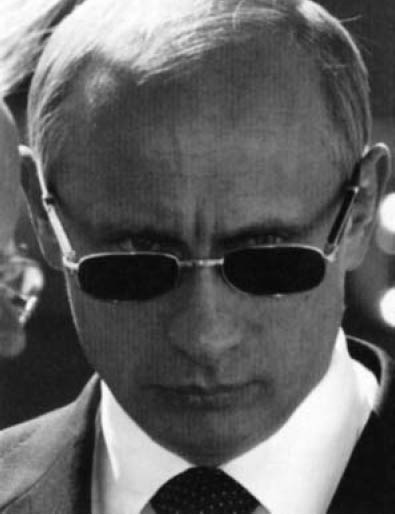Who causes Russia's problems? RUSSIANS, of course!
 Writing in the Moscow Times, columnist Konstantin Sonin, a professor at the New Economic School/CEFIR, explains that Russians are far more dangerous to Russia than the country's so-called "foreign enemies." And who is the most dangerous Russian of all? LR won't say, but she'll give you hint: His initials are V.V.P. (no, it doesn't stand for "very, very pathological" -- but it might as well). Pity that Professor Sonin doesn't have the guts to take his analysis to its logical conclusion, that the first step towards success in Russia is to stop being ruled by a proud KGB spy, a relic of failure, the worst thing possible for Russia.
Writing in the Moscow Times, columnist Konstantin Sonin, a professor at the New Economic School/CEFIR, explains that Russians are far more dangerous to Russia than the country's so-called "foreign enemies." And who is the most dangerous Russian of all? LR won't say, but she'll give you hint: His initials are V.V.P. (no, it doesn't stand for "very, very pathological" -- but it might as well). Pity that Professor Sonin doesn't have the guts to take his analysis to its logical conclusion, that the first step towards success in Russia is to stop being ruled by a proud KGB spy, a relic of failure, the worst thing possible for Russia.
New York Times journalist Thomas Friedman gave a talk in Moscow two weeks ago in which he discussed his "flat world" theory about the leveling of the global economic playing field. Friedman's first article published after his return from Moscow was dedicated to Russia, recounting a story about the Kosygin reforms that was recounted to him by Vladimir Mau, rector of Russia's Academy of National Economy.
The reforms were a series of economic initiatives begun in 1965 by Soviet Premier Alexei Kosygin, intended to correct ineffective state planning policies. The reforms were shelved for 20 years, however, when gas reserves in western Siberia were tapped in the late 1960s and world oil prices rose sharply in the mid-1970s. Once the leadership started receiving substantial oil and gas export revenues, it forgot about reforms, content to import greater and greater quantities of foodstuffs while domestic agricultural production declined. Moscow even concluded that it could afford to wage a war in Afghanistan. But when oil and gas prices fell in 1985, the country was unprepared for economic difficulties and too inflexible politically to adjust its economic system.
Speaking on Saturday at a security conference in Munich, President Vladimir Putin used language reminiscent of the Cold War days, that also illustrated Friedman's simple theory: High oil and gas prices have enabled Russia to pursue a more aggressive political agenda on the world stage. What was disturbing about the speech was not that it might involve Russia in unnecessary competition with obviously stronger rivals. It may not. The problem was that it directed public discussion inside Russia toward foreign policy.
Despite what combat veterans of the Cold War might say, the country's problems have little to do with events abroad and everything to do with those at home. This should be clear from 20th-century history. No external influence brought on the Stalinist terror of the 1920s and 1930s -- one of the century's biggest humanitarian catastrophes. Had structures of authority not been organized according to the law of the jungle, it might also have been possible to avert the famine that swept the country in 1932 and 1933. In the famine that hit from 1921 to 1923, international organizations were the ones that saved millions from starvation in central Russia. External factors were also not to blame for the country's poor state of preparedness for Nazi Germany's attack in June 1941.
If Communist leaders had not been so caught up in slaughtering their political opponents, the deaths of millions during the first year of the war with Germany might have been avoided. Schemes on the part of Russia's global rivals were also not the cause of the economic collapse and breakup of the Soviet Union in the late 1980s. No matter how strongly Pentagon hawks might imagine it was a result of their handiwork, it was the Soviet leadership, isolated from the real economic conditions in the country by layers of bureaucratic and political barriers, that made decisions that damaged the economy just as badly as enemy bombs could have. The decision to re-route rivers and drain the Aral Sea during a period of national food shortages so acute that they were even felt even in Moscow should be considered here, as should Mikhail Gorbachev's anti-alcohol campaign timed to coincide with a severe budgetary crisis.
The danger for any country "cursed" with plentiful resources is not that oil or diamonds force leaders to act foolishly. Such riches simply allow them to do so. The safeguards against such policies should lie in a functioning parliament, the press and local and regional authorities. If they are unable to serve this purpose, like the the Central Party Committee, the State Planning Committee and the KGB were clearly not ready for the events in 1985, it is no one else's fault. If Russia is not ready to face today's challenges, it will be neither the United States' fault nor its problem.


















No comments:
Post a Comment